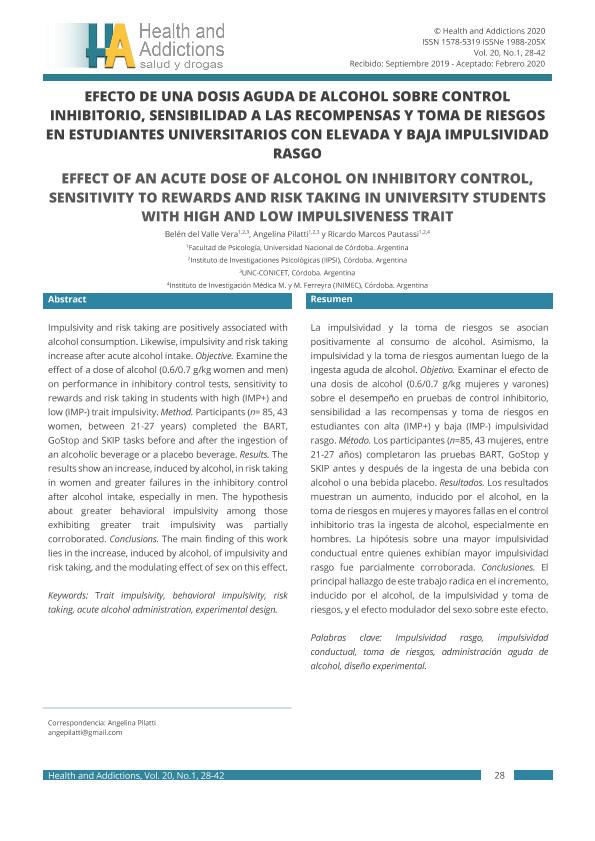Mostrar el registro sencillo del ítem
dc.contributor.author
Vera, Belén del Valle

dc.contributor.author
Pilatti, Angelina

dc.contributor.author
Pautassi, Ricardo Marcos

dc.date.available
2021-11-18T16:13:34Z
dc.date.issued
2020-03
dc.identifier.citation
Vera, Belén del Valle; Pilatti, Angelina; Pautassi, Ricardo Marcos; Efecto de una dosis aguda de alcohol sobre control inhibitorio, sensibilidad a las recompensas y toma de riesgos en estudiantes universitarios con elevada y baja impulsividad rasgo; Instituto de Investigación de Drogodependencias; Health and Addictions; 20; 1; 3-2020; 28-42
dc.identifier.issn
1988-205X
dc.identifier.uri
http://hdl.handle.net/11336/147158
dc.description.abstract
La impulsividad y la toma de riesgos se asocian positivamente al consumo de alcohol. Asimismo, la impulsividad y la toma de riesgos aumentan luego de la ingesta aguda de alcohol. Objetivo. Examinar el efecto de una dosis de alcohol (0.6/0.7 g/kg mujeres y varones) sobre el desempeño en pruebas de control inhibitorio, sensibilidad a las recompensas y toma de riesgos en estudiantes con alta (IMP+) y baja (IMP-) impulsividad rasgo. Método. Los participantes (n=85, 43 mujeres, entre 21-27 años) completaron las pruebas BART, GoStop y SKIP antes y después de la ingesta de una bebida con alcohol o una bebida placebo. Resultados. Los resultados muestran un aumento, inducido por el alcohol, en la toma de riesgos en mujeres y mayores fallas en el control inhibitorio tras la ingesta de alcohol, especialmente en hombres. La hipótesis sobre una mayor impulsividad conductual entre quienes exhibían mayor impulsividad rasgo fue parcialmente corroborada. Conclusiones. El principal hallazgo de este trabajo radica en el incremento, inducido por el alcohol, de la impulsividad y toma de riesgos, y el efecto modulador del sexo sobre este efecto.
dc.description.abstract
Impulsivity and risk taking are positively associated with alcohol consumption. Likewise, impulsivity and risk taking increase after acute alcohol intake. Objective. Examine the effect of a dose of alcohol (0.6/0.7 g/kg women and men) on performance in inhibitory control tests, sensitivity to rewards and risk taking in students with high (IMP+) and low (IMP-) trait impulsivity. Method. Participants (n= 85, 43 women, between 21-27 years) completed the BART, GoStop and SKIP tasks before and after the ingestion of an alcoholic beverage or a placebo beverage. Results. The results show an increase, induced by alcohol, in risk taking in women and greater failures in the inhibitory control after alcohol intake, especially in men. The hypothesis about greater behavioral impulsivity among those exhibiting greater trait impulsivity was partially corroborated. Conclusions. The main finding of this work lies in the increase, induced by alcohol, of impulsivity and risk taking, and the modulating effect of sex on this effect.
dc.format
application/pdf
dc.language.iso
spa
dc.publisher
Instituto de Investigación de Drogodependencias
dc.rights
info:eu-repo/semantics/openAccess
dc.rights.uri
https://creativecommons.org/licenses/by-nc-sa/2.5/ar/
dc.subject
impulsividad rasgo
dc.subject
impulsividad estado
dc.subject
diseño experimental
dc.subject
alcohol
dc.subject
ACUTE ALCOHOL ADMINISTRATION
dc.subject
BEHAVIORAL IMPULSIVITY
dc.subject
EXPERIMENTAL DESIGN
dc.subject
RISK TAKING
dc.subject
TRAIT IMPULSIVITY
dc.subject.classification
Drogadicción

dc.subject.classification
Ciencias de la Salud

dc.subject.classification
CIENCIAS MÉDICAS Y DE LA SALUD

dc.title
Efecto de una dosis aguda de alcohol sobre control inhibitorio, sensibilidad a las recompensas y toma de riesgos en estudiantes universitarios con elevada y baja impulsividad rasgo
dc.title
Effect of an acute dose of alcohol on inhibitory control, sensitivity to rewards and risk taking in university students with high and low impulsiveness trait
dc.type
info:eu-repo/semantics/article
dc.type
info:ar-repo/semantics/artículo
dc.type
info:eu-repo/semantics/publishedVersion
dc.date.updated
2021-09-27T15:23:03Z
dc.journal.volume
20
dc.journal.number
1
dc.journal.pagination
28-42
dc.journal.pais
España

dc.journal.ciudad
Alicante
dc.description.fil
Fil: Vera, Belén del Valle. Universidad Nacional de Córdoba. Facultad de Psicología; Argentina. Universidad Nacional de Córdoba. Instituto de Investigaciones Psicológicas. - Consejo Nacional de Investigaciones Científicas y Técnicas. Centro Científico Tecnológico Conicet - Córdoba. Instituto de Investigaciones Psicológicas; Argentina
dc.description.fil
Fil: Pilatti, Angelina. Universidad Nacional de Córdoba. Facultad de Psicología; Argentina. Universidad Nacional de Córdoba. Instituto de Investigaciones Psicológicas. - Consejo Nacional de Investigaciones Científicas y Técnicas. Centro Científico Tecnológico Conicet - Córdoba. Instituto de Investigaciones Psicológicas; Argentina
dc.description.fil
Fil: Pautassi, Ricardo Marcos. Universidad Nacional de Córdoba. Facultad de Psicología; Argentina. Universidad Nacional de Córdoba. Instituto de Investigaciones Psicológicas. - Consejo Nacional de Investigaciones Científicas y Técnicas. Centro Científico Tecnológico Conicet - Córdoba. Instituto de Investigaciones Psicológicas; Argentina. Consejo Nacional de Investigaciones Científicas y Técnicas. Centro Científico Tecnológico Conicet - Córdoba. Instituto de Investigación Médica Mercedes y Martín Ferreyra. Universidad Nacional de Córdoba. Instituto de Investigación Médica Mercedes y Martín Ferreyra; Argentina
dc.journal.title
Health and Addictions
dc.relation.alternativeid
info:eu-repo/semantics/altIdentifier/doi/https://doi.org/10.21134/haaj.v20i1.461
dc.relation.alternativeid
info:eu-repo/semantics/altIdentifier/url/https://ojs.haaj.org/index.php?journal=haaj&page=article&op=view&path%5B%5D=461
Archivos asociados
